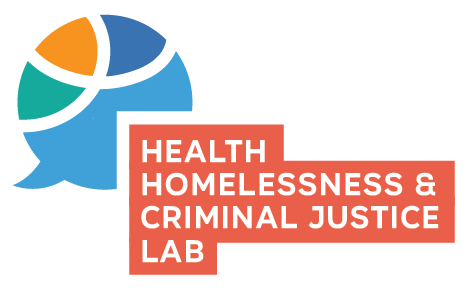
Health, homelessness, and criminal justice involvement do not exist in a vacuum. In our lab, we work to examine the overlap of these factors in order to find evidence-based policy that can improve health equity.
HHCJLab Highlights
Diabetes Homelessness Medication Support (DHomes) Study
In the DHomes study, Dr. Vickery, HHCJ lab staff, and a multi-stakeholder research team focuses on the health of people experiencing Type 2 Diabetes and homelessness.
+ Read more →
In the DHomes study, Dr. Vickery, HHCJ lab staff, and a multi-stakeholder research team focuses on the health of people experiencing Type 2 Diabetes and homelessness. This is a three part project. First, we conducted focus groups and interviews with service providers and people experiencing homeless to find out what type of program would best help patients manage their diabetes. Second, we used that data to design a Diabetes Wellness Coaching program. Our goal is to support people to improve their overall wellness and diabetes management (hemoglobin A1c) through improved medication adherence and better use of community resources. Diabetes Wellness Coaches work with participants for a total of 10 weeks to help them set medication and health specific goals to improve their health. Third, we will pilot test the program, in a randomized pilot clinical trial.
The project is funded by the National Institute of Diabetes and Digestive and Kidney Diseases.
Jail based use of smoking cessation treatment (JUST)
In this pilot clinical trial, Dr. Winkelman and Dr. Andrew Busch (Behavioral Health Disparities Research Group, Hennepin Healthcare Research Institute) conducted the first ever smoking cessation trial in a US county jail setting.
+ Read more →
In this pilot clinical trial, Dr. Winkelman and Dr. Andrew Busch (Behavioral Health Disparities Research Group, Hennepin Healthcare Research Institute) conducted the first ever smoking cessation trial in a US county jail setting. In this study, participants assigned to the intervention group received counseling while they were in jail and counseling plus nicotine lozenges after they were released. This is the standard treatment for people who use tobacco but incarcerated individuals rarely have access to this type of care. We found that people were enthusiastic about participating and that this type of intervention may help people reduce their smoking when they leave jail.
This study was funded by Clearway Minnesota and published in JAMA Network Open.
zAmya Theater + HHCJ Collaboration
In this community engaged research project, our HHCJ staff and participatory research team had the opportunity to collaborate with the zAmya Theater.
+ Read more →
In this community engaged research project, our HHCJ staff and participatory research team had the opportunity to collaborate with the zAmya Theater. Using themes generated in qualitative focus groups conducted by Dr. Vickery and research staff, zAmaya Theater actors and participatory research team members wrote and performed a theatrical production called Life Heist: Stealing Hope while Surviving Diabetes and Homelessness. Through Life Heist, we were able to tell the stories of people who are traditionally voiceless. This collective effort has been one step toward changing the narrative on the typical relationship between community and research.
This project is funded by the Program in Health Disparities Research at the University of Minnesota.
Transitions Clinic Network: Post Incarceration Addiction Treatment, Healthcare, and Social Support (TCN-PATHS)
HHCJ is one of six sites participating in a nationwide study led by Yale University to prevent opioid overdose among people recently released from jail or prison.
+ Read more →
HHCJ is one of six sites participating in a nationwide study led by Yale University to prevent opioid overdose among people recently released from jail or prison. This 5-year study aims to measure the relative effectiveness of providing care at a Transitions Clinic versus a standard primary care clinic for people recently released from jail. Transitions Clinics use an innovative approach to linking people to care after release, which centers around working with a Community Health Worker who has lived experience of incarceration and training clinic staff to meet the unique needs of the justice-involved population. To learn more about the Transitions Clinic Network, visit https://transitionsclinic.org/.
This project is funded by the National Institute on Drug Abuse’s Justice Community Opioid Innovation Network. Additional information about this study is available here.
-
RT @YaleADM: (1/2) Thanks to all who joined us this afternoon for #addiction medicine rounds with @tylerwinkelman (@HHCJ_Lab… https://t.co/iPZJNLs981
-
RT @rohankhaz: 1/🚨💡🗺️ *NEW* in @JAMANetworkOpen w/@UREssien @kmcmanusMD We know minoritized & rural populations have had less… https://t.co/u9mR0BA320
-
The @HHCJ_Lab's Moncies Franco and @tylerwinkelman are back to discuss the Monkeypox Virus. They address the basic… https://t.co/58Rt221pdx
-
RT @ChomiloMD: Voting is tied to community health & #HealthEquity! I vote for leaders that will champion health justice &… https://t.co/lhD0JzA7yL
-
RT @SEICHE_Yale: We're excited to co-sponsor this addiction medicine rounds by @tylerwinkelman from @HennepinHC @HHCJ_Lab… https://t.co/tNR4ZHq2FO

